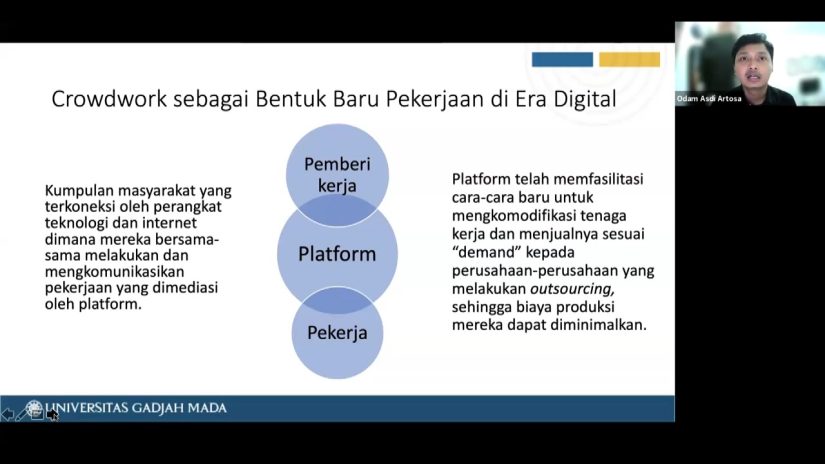
Yogyakarta, October 25th 2023—Work styles in this era have experienced significant changes. Since the pandemic, 22% of people prefer to work from home, and 32% prefer digital work. This indicates a change in work trends which are starting to be dominated by the digital space. The Social Research Center (SORES) Fisipol UGM raised this issue in a seminar entitled “Future Work: Challenges and Vulnerabilities of Indonesia’s Future” on Wednesday (25/10).
Three things trigger changes in work models now and might in the future. These three are disruption, technological adaptation, and work transformation. “Technology, climate change and the pandemic are among the big change makers. This changes the way people live, starting from the way they work, move and interact. Actually, before that, there had been technological adaptations to the emergence of AI. But with the pandemic, this completes the existing disruption. “This also raises issues related to differences in technology mastery among certain age groups, or generations,” said Odan Asdi Artosa, Researcher at SOREC Fisipol UGM.
The digital era means that anyone connected to a device and the internet can interact with each other without having to meet face to face. The advantage of this technology is that many jobs take the form of crowdwork, namely a group of people working together on a certain platform. The McKinsey Global Institute estimates that these factors will cause 400-800 million people to lose their jobs in 2030. This phenomenon is caused by the inability of the workforce to adapt to technological developments and existing jobs. That is why future job projections need to be considered so that the workforce can prepare the skills needed by the industry.
“If in the past you had to go to the office to work, now you are free. As long as we are connected to a device and the internet, we are free to work anywhere. The role of the platform here is also to act as a link between industrial demand and the workforce. So who exactly are these crowdworkers? Based on the data, crowdworkers are dominated by the age group 26 years and over. “So young people have an important role,” said Odan. The International Labor Organization (ILO) has divided digital era jobs into two, namely web-based and location-based. Both are supported by the platform as the main medium. However, the difference is that location-based still has a close relationship with location.
In contrast to the rapid development of technology, employment adaptation to this disruption does not appear to be optimal. The speed of information and ease of communication do not make jobs easy to get. In fact, the available information tends to overlap, resulting in workers having difficulty getting the job they want or according to their educational background. This issue was also raised by the author of the book titled “What Not Much Is Said About Media Workers”, Citra Maudy Mahanani.
“After graduating from school, many of these young people are fed up with society’s opinions. Such as having to start an internship while in college, salary preferences, and so on. So they are still confused about how to look for work. “For some people, even an unworthy job is better than not working,” said Citra. The opening of various job opportunities in the digital space does not necessarily make all of these jobs feasible. Unfortunately, because job absorption is not optimal, this condition makes it difficult for workers to get out of jobs they don’t want.
The issue raised by SOREC Fisipol UGM in the context of the 68th Anniversary is in line with point 8 of the Sustainable Development Goals (SDGs), namely decent work and economic growth. Digital disruption is inevitable. Not only Indonesia, but other countries also have their challenges in dealing with employment issues. For this reason, there needs to be encouragement to prioritize this issue as part of efforts to adapt to changes towards a Golden Indonesia 2045.
